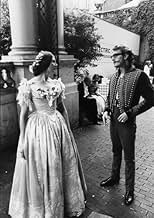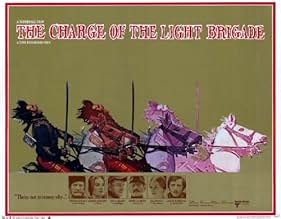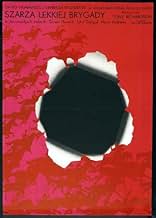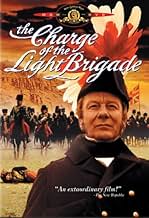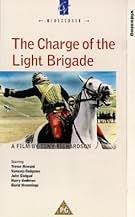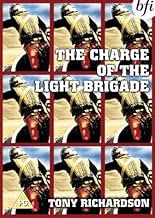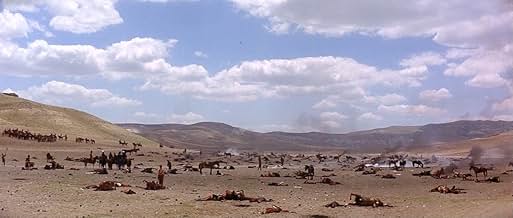La charge de la brigade légère
Titre original : The Charge of the Light Brigade
- 1968
- Tous publics
- 2h 19min
NOTE IMDb
6,6/10
4,1 k
MA NOTE
En 1854, pendant la guerre de Crimée, une mauvaise planification conduit la brigade légère britannique à charger ouvertement une position d'artillerie russe, avec des conséquences tragiques.En 1854, pendant la guerre de Crimée, une mauvaise planification conduit la brigade légère britannique à charger ouvertement une position d'artillerie russe, avec des conséquences tragiques.En 1854, pendant la guerre de Crimée, une mauvaise planification conduit la brigade légère britannique à charger ouvertement une position d'artillerie russe, avec des conséquences tragiques.
- Réalisation
- Scénario
- Casting principal
- Nomination aux 7 BAFTA Awards
- 7 nominations au total
John J. Carney
- Trooper Mitchell
- (as John Carney)
Howard Marion-Crawford
- Lt. Gen. Sir George Brown
- (as Howard Marion Crawford)
Christopher Cunningham
- Farrier
- (as Chris Cunningham)
Avis à la une
Tony Richards was an ideas man, in some loose sense a lot like his contemporary 60s director Richard Lester. The two of them were mavericks, often eschewing traditional and reliable modes of film making in preference to trying out unchartered techniques - born out of nothing else but their own imaginations. Lester did this to achieve an original knockabout and racy product, and Richardson did it to achieve a more stark and poignant effect for the supposed thinking-man's 'swinging' audience of the time. However, not all these ideas worked well in practice. The Charge of the Light Brigade is an example of one of these misfires.
The film is a classic piece of late sixties film making; both in the bizarre arty techniques used, and in the bold anti-war message. The idea of the film is to shamelessly point out the blind arrogance that lies behind the decisions made by those at the top to go to war. Arrogance, the film conveys very clearly, which is based purely upon blissful ignorance. The audience is invited to feast upon the bumbling Lord Raglan (John Gielgud), who nonchalantly sits at his desk in the war office and calls the shots based only on his devotion to England's great past, rather than on any rational thought. We meet, and are disgusted with, Lord Cardigan (Trevor Howard) whose arrogance is the driving force behind all he does. He believes that he is always right no matter what, simply because as the captain he is in charge. He's more concerned with what his men drink out of in the mess, and punishing them for their wrongdoings, rather than on running a well oiled military machine. To him, he is the most important part of that machine.
In contrast to these men is Nolan (David Hemmings), an idealistic military man with 'principles'. He believes in good sound leadership and decision making, and as such is constantly at odds with the stuffy and arrogant attitudes of his superiors - they are always right and he should speak when he's spoken to, even if he has a valid idea. Note Lord Raglan's line: "It is a sad day for Britain when her officers know too much what they are doing." Nolan is the man trying to fight vainly against the ignorance-entrenched system.
All this happens to the backdrop of Britain choosing to join in on a foreign war - to save Turkey from Russia. It is a war Engalnd should not have been involved in, but the arrogant big wigs made the decision to go. In true 60s anti-war style, the arrogance of those in charge of the war machine brings about its own destruction. Nolan was right, Raglan and Cardigan were wrong and didn't care to accept that, the light brigade was lost, and a blaming game ensues. While riding over the corpse of Nolan, Cardigan threw the blame on Lord Lucan, Lucan in turn threw the hot potato to Raglan, and Raglan laid the blame on the poor innocent man who wrote the order that Raglan himself dictated to him. As such, the pointlessness of war, and the destructive capability of blind ignorance based on an arrogance derived solely from power was brought forth clearly.
However, the directing techniques to bring this powerfully stark message to life were not up to the task. Too many dreamy sequences were used which just distract the audience; the script was at times just downright boring; and too often, in the director's eagerness to achieve an arty effect, the powerful meaning of an entire scene was lost. It is one of those films that you really have to pay attention to and concentrate on the whole way through; and this isn't just because The Charge of the Light Brigade is a thinking-man's film, it is because the meaning of many of the scenes is hidden, shrouded behind quite a bit of self-indulgent (or imaginative) imagery. Too often Tony Richardson's 'ideas' simply confuse the audience.
However, as I have said, the film does have a point to make, and this point is evident to all at the end of the film, no matter how many scenes were a little too cryptic. Therefore the film was successful. In addition, there were many great scenes, such as the one where Lord Raglan rides straight through a peaceful anti-war demonstration on his horse, destroying banners and calling the demonstrators traitors. The scene where the British soldiers were seen dying of heatstroke on the plains before even reaching Sebastopol was done well, especially when the scene cut straight to London, where it was reported in the newspapers, untruthfully, that Sebastopol had already fallen. This scene went straight for the jugular in its anti-propaganda and anti-government stance. And of course there is the brilliant period animation showing England as the saviour of the world, and the encourager of world industry and prosperity. These animations contrasted beautifully with the scenes of petty bickering and war-mongering in Lord Raglan's corridors of power.
A great cast and a stark and powerful idea make The Charge of the Light Brigade an interesting film, and at least a good production. The film still rings through in todays international and political climate, and especially shows how not so far we have come, and how many mistakes we have not learned from since the 1960s, and even since the 1850s. However, a sharper script and clearer direction would have helped immeasurably, and would have probably transformed this film into a classic powerhouse, rather than the languishing near miss it is. 6/10
The film is a classic piece of late sixties film making; both in the bizarre arty techniques used, and in the bold anti-war message. The idea of the film is to shamelessly point out the blind arrogance that lies behind the decisions made by those at the top to go to war. Arrogance, the film conveys very clearly, which is based purely upon blissful ignorance. The audience is invited to feast upon the bumbling Lord Raglan (John Gielgud), who nonchalantly sits at his desk in the war office and calls the shots based only on his devotion to England's great past, rather than on any rational thought. We meet, and are disgusted with, Lord Cardigan (Trevor Howard) whose arrogance is the driving force behind all he does. He believes that he is always right no matter what, simply because as the captain he is in charge. He's more concerned with what his men drink out of in the mess, and punishing them for their wrongdoings, rather than on running a well oiled military machine. To him, he is the most important part of that machine.
In contrast to these men is Nolan (David Hemmings), an idealistic military man with 'principles'. He believes in good sound leadership and decision making, and as such is constantly at odds with the stuffy and arrogant attitudes of his superiors - they are always right and he should speak when he's spoken to, even if he has a valid idea. Note Lord Raglan's line: "It is a sad day for Britain when her officers know too much what they are doing." Nolan is the man trying to fight vainly against the ignorance-entrenched system.
All this happens to the backdrop of Britain choosing to join in on a foreign war - to save Turkey from Russia. It is a war Engalnd should not have been involved in, but the arrogant big wigs made the decision to go. In true 60s anti-war style, the arrogance of those in charge of the war machine brings about its own destruction. Nolan was right, Raglan and Cardigan were wrong and didn't care to accept that, the light brigade was lost, and a blaming game ensues. While riding over the corpse of Nolan, Cardigan threw the blame on Lord Lucan, Lucan in turn threw the hot potato to Raglan, and Raglan laid the blame on the poor innocent man who wrote the order that Raglan himself dictated to him. As such, the pointlessness of war, and the destructive capability of blind ignorance based on an arrogance derived solely from power was brought forth clearly.
However, the directing techniques to bring this powerfully stark message to life were not up to the task. Too many dreamy sequences were used which just distract the audience; the script was at times just downright boring; and too often, in the director's eagerness to achieve an arty effect, the powerful meaning of an entire scene was lost. It is one of those films that you really have to pay attention to and concentrate on the whole way through; and this isn't just because The Charge of the Light Brigade is a thinking-man's film, it is because the meaning of many of the scenes is hidden, shrouded behind quite a bit of self-indulgent (or imaginative) imagery. Too often Tony Richardson's 'ideas' simply confuse the audience.
However, as I have said, the film does have a point to make, and this point is evident to all at the end of the film, no matter how many scenes were a little too cryptic. Therefore the film was successful. In addition, there were many great scenes, such as the one where Lord Raglan rides straight through a peaceful anti-war demonstration on his horse, destroying banners and calling the demonstrators traitors. The scene where the British soldiers were seen dying of heatstroke on the plains before even reaching Sebastopol was done well, especially when the scene cut straight to London, where it was reported in the newspapers, untruthfully, that Sebastopol had already fallen. This scene went straight for the jugular in its anti-propaganda and anti-government stance. And of course there is the brilliant period animation showing England as the saviour of the world, and the encourager of world industry and prosperity. These animations contrasted beautifully with the scenes of petty bickering and war-mongering in Lord Raglan's corridors of power.
A great cast and a stark and powerful idea make The Charge of the Light Brigade an interesting film, and at least a good production. The film still rings through in todays international and political climate, and especially shows how not so far we have come, and how many mistakes we have not learned from since the 1960s, and even since the 1850s. However, a sharper script and clearer direction would have helped immeasurably, and would have probably transformed this film into a classic powerhouse, rather than the languishing near miss it is. 6/10
Let's make it very clear from the outset, this version of The Charge of The Light Brigade is in no way a remake of the Errol Flynn film that Warner Brothers did in 1936. This is a factual account about how several hundred of the best of that generation in the United Kingdom met their deaths in the Crimea.
Great Britain from the end of the Napoleonic Wars until the beginning of World War I was only involved in two formally declared conflicts. Although many British folks will cite various colonial enterprises, the only two major wars the British were involved in were the Crimean War and the Boer War. And it was only the Crimean War which involved them with and against other European powers, in this case Russia.
It all was about propping up the Ottoman Empire and keeping the Russians from getting a hold of Istanbul and an outlet to the Mediterranean Sea for their fleet. The problem was all the powers were woefully unprepared for such a war, British included.
The Charge of the Light Brigade as no other film explores the incredible ineptitude of the British Army at that time. Today it beggars the imagination that field grade officers simply purchased their commissions. It's true though, it's the reason why Lord Raglan, Lord Cardigan, and Lord Lucan a group of Colonel Blimps if there ever were, got in charge of things.
It's how it was done, the high army positions were reserved for their aristocracy. The Duke of Wellington had died in 1852, three years before the Crimean War and the charge. He also purchased his commission back in the day. It was just dumb luck that he happened to be a military genius. Lord Raglan who is played by John Gielgud was an able staff officer for Wellington, but as a strategist was hopelessly out of his depth.
Howewver the main two blunderers were a pair of quarreling in-laws, Lord Cardigan and Lord Lucan played by Trevor Howard and Harry Andrews. They would rather have sent their armies against each other than the Russians.
A lot of the best of that generation died charging the heights of Balaclava that day to get to Sevastapol because of these two mutts. In any kind of system based on merit these two would never have gotten to be sergeants let alone generals.
The Crimean War which basically ended as a stalemate because the Russians were as inept as the British led eventually to reform of the army. That reform came in the first ministry of William Gladstone (1868-1874)and his very able Secretary for War Lord Edward Cardwell who finally got Parliament to abolish purchase commissions and promotions were based on merit after that. Good thing too, because it staggers the imagination to think of the British Army going into World Wars I and II and the Boer War under the old system.
The charge at Balaclava gained its enduring legend through the popular poem of Alfred Lord Tennyson who was smart enough to romanticize the Noble Six Hundred instead of their inept leadership The movie that Errol Flynn and Olivia DeHavilland starred in back in 1936 was a romantic story inspired by that poem.
What Tony Richardson and the cast he directed in 1968 bring you the real story of the charge. It's a graphically accurate account and military historians should love this film.
Great Britain from the end of the Napoleonic Wars until the beginning of World War I was only involved in two formally declared conflicts. Although many British folks will cite various colonial enterprises, the only two major wars the British were involved in were the Crimean War and the Boer War. And it was only the Crimean War which involved them with and against other European powers, in this case Russia.
It all was about propping up the Ottoman Empire and keeping the Russians from getting a hold of Istanbul and an outlet to the Mediterranean Sea for their fleet. The problem was all the powers were woefully unprepared for such a war, British included.
The Charge of the Light Brigade as no other film explores the incredible ineptitude of the British Army at that time. Today it beggars the imagination that field grade officers simply purchased their commissions. It's true though, it's the reason why Lord Raglan, Lord Cardigan, and Lord Lucan a group of Colonel Blimps if there ever were, got in charge of things.
It's how it was done, the high army positions were reserved for their aristocracy. The Duke of Wellington had died in 1852, three years before the Crimean War and the charge. He also purchased his commission back in the day. It was just dumb luck that he happened to be a military genius. Lord Raglan who is played by John Gielgud was an able staff officer for Wellington, but as a strategist was hopelessly out of his depth.
Howewver the main two blunderers were a pair of quarreling in-laws, Lord Cardigan and Lord Lucan played by Trevor Howard and Harry Andrews. They would rather have sent their armies against each other than the Russians.
A lot of the best of that generation died charging the heights of Balaclava that day to get to Sevastapol because of these two mutts. In any kind of system based on merit these two would never have gotten to be sergeants let alone generals.
The Crimean War which basically ended as a stalemate because the Russians were as inept as the British led eventually to reform of the army. That reform came in the first ministry of William Gladstone (1868-1874)and his very able Secretary for War Lord Edward Cardwell who finally got Parliament to abolish purchase commissions and promotions were based on merit after that. Good thing too, because it staggers the imagination to think of the British Army going into World Wars I and II and the Boer War under the old system.
The charge at Balaclava gained its enduring legend through the popular poem of Alfred Lord Tennyson who was smart enough to romanticize the Noble Six Hundred instead of their inept leadership The movie that Errol Flynn and Olivia DeHavilland starred in back in 1936 was a romantic story inspired by that poem.
What Tony Richardson and the cast he directed in 1968 bring you the real story of the charge. It's a graphically accurate account and military historians should love this film.
First, it should be noted that Tony Richardson's "The Charge of the Light Brigade (1968) is not a remake of the Errol Flynn classic adventure film of 1936; rather it is based on the Cecil Woodham-Smith work of military history, "The Reason Why". Both book and film are a debunking of the Tennyson poem. And hard as it is to believe, Richardson's film actually tones down the absurdities of the three principle figures responsible for the debacle at Balaclava. And these three stooges thoroughly deserve the censure of history, for never were the lives of six hundred brave men thrown away more senselessly than with the charge of the Light Brigade.
Richardson depicts the insanity of the Crimean War and Victorian society's glorification of militarism with a death's head sense of humor which makes the horrors of the conflict all the more potent. And he is unsparing in his condemnation of the culture that could glorify so unmitigated a disaster as Balaclava. The film was made at the height of America's involvement in the Vietnam War and it is an implicit critique of that conflict and war in general in that all countries regardless of time and place indulge in the pastime of National Lying. The greater the calamity, the greater the need to lie or glorify, for always the dead must count for something. In that sense the film is universal as well as timeless.
Using animation in the style of the Victorian newspaper caricaturists, during the opening credits, the film quickly details the events that led up to the war. This is also one of the few films to hold the media, in this case the English newspapers of the time, accountable for their actions. Instead of calling for deliberations and a halt to the madness that must inevitably lead to war, the press is shown whipping the British nation into war frenzy. These animated sequences which appear throughout the film to forward the exposition are both wonderfully inventive and wickedly delicious.
Throughout the film which is satiric and misanthropic in tone, the lower classes are shown to be stupid, ugly, and easily led, while the upper classes are shown to be stupid, beautiful, and utterly incapable of leading. Indeed the only decent individuals portrayed are either destroyed or trampled under foot by events and/or the arrogant stupidity of their superiors. Yet Richardson is never judgmental; rather he takes a Kubrickian detached point of view, allowing the viewers to observe the era and its foibles/morals and judge for themselves. And England of the mid-nineteenth century is beautifully recreated here. Hairstyles and uniforms and sets are rendered in exquisite detail. It takes its rightful place along side "Barry Lyndon" and "The Duelists" as among the most successful period recreations.
The film also uses a lot of period colloquialisms such as, "My cherry-bums!" and "All this swish-n-tits has made me randified!" and "You tell that stew-stick of a brother-in-law, that Brudenell to fetch off!" Wonderful, though some first time viewers may have difficulty understanding exactly what has just been expressed. And what a cast! Trevor Howard, Harry Andrews and especially John Gielgud give career topping performances. Gielgud as Lord Raglan, the slightly befuddled commander-in-chief, steals every scene he is in. Aging, tired in mind and body, missing one arm, continuously mistaking the French, ("Our allies, My Lord...") for the enemy, never quite grasping the situation whether in his office or on the field of battle, ("England is pretty, babies are pretty, some table linen is very pretty!") Its a delightful comic turn. And who wouldn't feel sorry for anyone unfortunate enough to be caught between Trevor Howard as the choleric Lord Cardigan, ("The melancholy truth was that his golden head had nothing in it.") and Harry Andrews as the equally bilious Lord Lucan? From the moment we see his saturnine countenance striding up the marble steps of the War Office we know this is a humorless, flint-hearted martinet. Both Lords had a long running personal feud which they quickly placed on an official level as well with unfortunate consequences for the Light Brigade.
David Hemmings and Vanessa Redgrave are the young romantic leads. Hemmings is Captain Lewis Nolan, a forward thinking career officer with very definite ideas how war should be conducted. He has returned to England after service in India to join Cardigan's regiment, and quickly runs afoul of the Lord in the affair of the "Black Bottle". In reality it involved another officer, who Cardigan placed under arrest for serving porter, (it was actually Moselle) when he had given strict orders that only champagne be served at the mess. Nolan the professional is unstinting in his criticisms or the three amateur Lords conduct of the war, and yet he too will play an unwitting part in the final destruction of the Brigade. A man of honor, whose honor however does not prelude having an affair with his best friends wife. Redgrave as the wife is as always, luminescent. The supporting cast sparkles as well. Mark Dignam as General Airey, Raglan's Chief of Staff, ("Speak up Nolan, he's a bit hard of hearing, and that statue doesn't help!") Howard Marion-Crawford as Lt. General Sir George Brown, Peter Bowles as Captain Henry Duberly, Norman Rossington as Sergeant Major Corbett, ("Right foot, straw foot!") and especially Jill Bennett as a lascivious Fanny Duberly all are very effective. This was also one of the last appearances of the great English classical actor, Sir Donald Wolfit, who would die later that year.
Finally enough cannot be said of Charles Wood's wonderful screenplay. With its exquisite use of the period vernacular it does a superb job of combining characters while paring history down to the essential to reconstruct the chain of events that led up to the destruction of the Light Brigade.
Richardson depicts the insanity of the Crimean War and Victorian society's glorification of militarism with a death's head sense of humor which makes the horrors of the conflict all the more potent. And he is unsparing in his condemnation of the culture that could glorify so unmitigated a disaster as Balaclava. The film was made at the height of America's involvement in the Vietnam War and it is an implicit critique of that conflict and war in general in that all countries regardless of time and place indulge in the pastime of National Lying. The greater the calamity, the greater the need to lie or glorify, for always the dead must count for something. In that sense the film is universal as well as timeless.
Using animation in the style of the Victorian newspaper caricaturists, during the opening credits, the film quickly details the events that led up to the war. This is also one of the few films to hold the media, in this case the English newspapers of the time, accountable for their actions. Instead of calling for deliberations and a halt to the madness that must inevitably lead to war, the press is shown whipping the British nation into war frenzy. These animated sequences which appear throughout the film to forward the exposition are both wonderfully inventive and wickedly delicious.
Throughout the film which is satiric and misanthropic in tone, the lower classes are shown to be stupid, ugly, and easily led, while the upper classes are shown to be stupid, beautiful, and utterly incapable of leading. Indeed the only decent individuals portrayed are either destroyed or trampled under foot by events and/or the arrogant stupidity of their superiors. Yet Richardson is never judgmental; rather he takes a Kubrickian detached point of view, allowing the viewers to observe the era and its foibles/morals and judge for themselves. And England of the mid-nineteenth century is beautifully recreated here. Hairstyles and uniforms and sets are rendered in exquisite detail. It takes its rightful place along side "Barry Lyndon" and "The Duelists" as among the most successful period recreations.
The film also uses a lot of period colloquialisms such as, "My cherry-bums!" and "All this swish-n-tits has made me randified!" and "You tell that stew-stick of a brother-in-law, that Brudenell to fetch off!" Wonderful, though some first time viewers may have difficulty understanding exactly what has just been expressed. And what a cast! Trevor Howard, Harry Andrews and especially John Gielgud give career topping performances. Gielgud as Lord Raglan, the slightly befuddled commander-in-chief, steals every scene he is in. Aging, tired in mind and body, missing one arm, continuously mistaking the French, ("Our allies, My Lord...") for the enemy, never quite grasping the situation whether in his office or on the field of battle, ("England is pretty, babies are pretty, some table linen is very pretty!") Its a delightful comic turn. And who wouldn't feel sorry for anyone unfortunate enough to be caught between Trevor Howard as the choleric Lord Cardigan, ("The melancholy truth was that his golden head had nothing in it.") and Harry Andrews as the equally bilious Lord Lucan? From the moment we see his saturnine countenance striding up the marble steps of the War Office we know this is a humorless, flint-hearted martinet. Both Lords had a long running personal feud which they quickly placed on an official level as well with unfortunate consequences for the Light Brigade.
David Hemmings and Vanessa Redgrave are the young romantic leads. Hemmings is Captain Lewis Nolan, a forward thinking career officer with very definite ideas how war should be conducted. He has returned to England after service in India to join Cardigan's regiment, and quickly runs afoul of the Lord in the affair of the "Black Bottle". In reality it involved another officer, who Cardigan placed under arrest for serving porter, (it was actually Moselle) when he had given strict orders that only champagne be served at the mess. Nolan the professional is unstinting in his criticisms or the three amateur Lords conduct of the war, and yet he too will play an unwitting part in the final destruction of the Brigade. A man of honor, whose honor however does not prelude having an affair with his best friends wife. Redgrave as the wife is as always, luminescent. The supporting cast sparkles as well. Mark Dignam as General Airey, Raglan's Chief of Staff, ("Speak up Nolan, he's a bit hard of hearing, and that statue doesn't help!") Howard Marion-Crawford as Lt. General Sir George Brown, Peter Bowles as Captain Henry Duberly, Norman Rossington as Sergeant Major Corbett, ("Right foot, straw foot!") and especially Jill Bennett as a lascivious Fanny Duberly all are very effective. This was also one of the last appearances of the great English classical actor, Sir Donald Wolfit, who would die later that year.
Finally enough cannot be said of Charles Wood's wonderful screenplay. With its exquisite use of the period vernacular it does a superb job of combining characters while paring history down to the essential to reconstruct the chain of events that led up to the destruction of the Light Brigade.
I first saw THE CHARGE OF THE LIGHT BRIGADE in the late 1970s when it was broadcast on the Sunday night " Film Of The Week " slot . I liked it as a young child , then saw it several years later and wasn't quite taken with it mainly down to the fact that the first half is very slow and the second half is grim and depressing
After just seeing it again about ten minutes ago I still hold my second opinion . I will congratulate ( With reservations ) the production team for making a very British type of historical epic , this is far more accurate than say ZULU which was ironically directed and co-written by a Hollywood film maker for a Hollywood studio and in that film Cy Endfield showed that perhaps you have to rewrite history ever so slightly to make a classic epic movie based upon actual events . Unfortunately by being as accurate as possible as a history lesson THE CHARGE OF THE LIGHT BRIGADE resembles the critically panned ZULU DAWN rather than ZULU which is in many film critics top ten movies including mine
We learn that many British officers in the Victorian British army bought themselves their rank causing serious friction with officers who were totally professional soldiers who achieved their rank through talent . We learn how calvarymen train , we learn what goes on in the officers mess , we learn that the Crimean war was the first conflict to get major press coverage but all this does tend to hold the story up . It may run for just over two hours but the movie feels much longer .
A cast member ( I can't remember which one ) was interviewed several years ago and she mentioned the production team's eye for detail so much that many of the cast honestly thought they'd been transported back to the mid 19th century . She also mentioned packed crowds watching the film in cinemas on opening night but the crowds had totally disappeared within a couple of days . You can't help but feel the attention to historical detail had everything to do with the poor box office . I guess the audience were expecting something in the vein of ZULU
As I said I will congratulate the production team for their accuracy in fine detail but bewarned it is top heavy with social comment and if you have little interest in history you might want to watch the latest Hollywood blockbuster instead
After just seeing it again about ten minutes ago I still hold my second opinion . I will congratulate ( With reservations ) the production team for making a very British type of historical epic , this is far more accurate than say ZULU which was ironically directed and co-written by a Hollywood film maker for a Hollywood studio and in that film Cy Endfield showed that perhaps you have to rewrite history ever so slightly to make a classic epic movie based upon actual events . Unfortunately by being as accurate as possible as a history lesson THE CHARGE OF THE LIGHT BRIGADE resembles the critically panned ZULU DAWN rather than ZULU which is in many film critics top ten movies including mine
We learn that many British officers in the Victorian British army bought themselves their rank causing serious friction with officers who were totally professional soldiers who achieved their rank through talent . We learn how calvarymen train , we learn what goes on in the officers mess , we learn that the Crimean war was the first conflict to get major press coverage but all this does tend to hold the story up . It may run for just over two hours but the movie feels much longer .
A cast member ( I can't remember which one ) was interviewed several years ago and she mentioned the production team's eye for detail so much that many of the cast honestly thought they'd been transported back to the mid 19th century . She also mentioned packed crowds watching the film in cinemas on opening night but the crowds had totally disappeared within a couple of days . You can't help but feel the attention to historical detail had everything to do with the poor box office . I guess the audience were expecting something in the vein of ZULU
As I said I will congratulate the production team for their accuracy in fine detail but bewarned it is top heavy with social comment and if you have little interest in history you might want to watch the latest Hollywood blockbuster instead
I do find it fascinating to come across obscure, almost forgotten films like this with familiar faces and famous actors in it. It was made ca. 1968, and in the true spirit of '68, it is strongly anti-war, anti-military, and anti-establishment, even though it is set in the Victorian era, the height of the Romantic age, when Military valor was largely celebrated. Military life is here portrayed in terms of ranks of men being bullied and brutalized by each successive rank above them, with the biggest, meanest and stupidest ones at the top.
I found it quite interesting to see the famous charge, celebrated in the romantic verses of Tennyson, portrayed in such a matter-of-fact manner as a series of tactical blunders due to bad communication and incompatible personalities among the commanders. These events were supposedly well-researched, and though I am not informed on the subject, I found this version of events very credible. Even with the high level of weapons and communications technology we have today, this sort of thing still happens. It must have been very common in centuries past.
To me, the dialog of this film and its delivery by the actors is its most remarkable feature. Seeing films that depict distant eras, I've often thought that these eras must have not just looked different from what we are used to, but sounded very different as well. If we were suddenly dropped into Victorian England, we wouldn't always understand what was being said or inferred to us. Words, phrases, gestures, facial expressions or body language that would have obvious meaning in that time and place would be strange to us. The language and syntax would, of course, be different, but so would the rhythm, pace, expressive color and accenting of the way people spoke. `Charge of the Light Brigade' does a remarkable job of not just looking, but sounding like a distant place and time. For a viewer who is not educated in antique British expressions and military jargon, as I am not, it makes watching this film a bit challenging, but it's like spending 130 minutes in the Victorian age as a so-called `fly-on-the-wall,' as the British put it. There was more than one line spoken after which I thought `say what?' But that's OK. It doesn't kill you, just encourages you to think a bit. This aspect of the film looks to be well-researched as well, a superb example of a somewhat talky script in which great care is taken with the language and its use by the actors. The script doesn't serve the purpose of an exposition device for the dumbest members of the audience, a very common vice in films, particularly big-money films engineered to alienate as few people as possible. It's an integral part of a design to recreate an unfamiliar time and place, and as such, a bit uncompromising.
I found it quite interesting to see the famous charge, celebrated in the romantic verses of Tennyson, portrayed in such a matter-of-fact manner as a series of tactical blunders due to bad communication and incompatible personalities among the commanders. These events were supposedly well-researched, and though I am not informed on the subject, I found this version of events very credible. Even with the high level of weapons and communications technology we have today, this sort of thing still happens. It must have been very common in centuries past.
To me, the dialog of this film and its delivery by the actors is its most remarkable feature. Seeing films that depict distant eras, I've often thought that these eras must have not just looked different from what we are used to, but sounded very different as well. If we were suddenly dropped into Victorian England, we wouldn't always understand what was being said or inferred to us. Words, phrases, gestures, facial expressions or body language that would have obvious meaning in that time and place would be strange to us. The language and syntax would, of course, be different, but so would the rhythm, pace, expressive color and accenting of the way people spoke. `Charge of the Light Brigade' does a remarkable job of not just looking, but sounding like a distant place and time. For a viewer who is not educated in antique British expressions and military jargon, as I am not, it makes watching this film a bit challenging, but it's like spending 130 minutes in the Victorian age as a so-called `fly-on-the-wall,' as the British put it. There was more than one line spoken after which I thought `say what?' But that's OK. It doesn't kill you, just encourages you to think a bit. This aspect of the film looks to be well-researched as well, a superb example of a somewhat talky script in which great care is taken with the language and its use by the actors. The script doesn't serve the purpose of an exposition device for the dumbest members of the audience, a very common vice in films, particularly big-money films engineered to alienate as few people as possible. It's an integral part of a design to recreate an unfamiliar time and place, and as such, a bit uncompromising.
Le saviez-vous
- AnecdotesFilming was immensely problematic. Director Tony Richardson fired a stunt coordinator whose manic swordplay killed several horses. An earthquake destroyed the hotel used by the production. David Hemmings was extremely temperamental on-set. The crew and extras, many of whom were Turkish soldiers, fought verbally and physically with local villagers who resented their incursion into the area. Richardson's strange mixture of perfectionism and historical flippancy grated on both his crew and advisers. While filming the final battle, the soldiers were called away for a NATO war exercise, forcing Richardson to shoot the scene with only a few dozen stuntmen.
- GaffesThe character called Featherstonehaugh (played by Corin Redgrave) has his name pronounced more or less as it is written, with four syllables. An upper-class Englishman of the mid-19th century (or, indeed, today) would pronounce it "Fanshawe".
- Citations
Lord Raglan: It will be a sad day for England when her armies are officered by men who know too well what they are doing - it smacks of murder.
- Crédits fousIn the animation over the opening credits, the English lion roars just as "A Woodfall Film" appears onscreen (mimicking Leo the Lion at the start of Metro-Goldwyn-Mayer movies).
- Versions alternativesAlthough the cinema version was complete the 1993 UK video release was cut by 7 secs to edit footage of horse-falls. The 2008 Optimum DVD has the cuts length extended to 14 secs and features the 6 minutes shorter print as mentioned below.
- ConnexionsFeatured in Otley (1969)
- Bandes originalesThe Girl I Left Behind Me
(uncredited)
Traditional
Arranged by Trevor L. Sharpe
Heard before the Battle of the Alma
Meilleurs choix
Connectez-vous pour évaluer et suivre la liste de favoris afin de recevoir des recommandations personnalisées
- How long is The Charge of the Light Brigade?Alimenté par Alexa
Détails
- Date de sortie
- Pays d’origine
- Langues
- Aussi connu sous le nom de
- La carga de la brigada ligera
- Lieux de tournage
- Pecenek, Turquie(charge in the Valley of Death)
- Société de production
- Voir plus de crédits d'entreprise sur IMDbPro
Box-office
- Budget
- 8 000 000 $US (estimé)
- Durée2 heures 19 minutes
- Couleur
- Mixage
- Rapport de forme
- 2.35 : 1
Contribuer à cette page
Suggérer une modification ou ajouter du contenu manquant

Lacune principale
By what name was La charge de la brigade légère (1968) officially released in India in English?
Répondre

